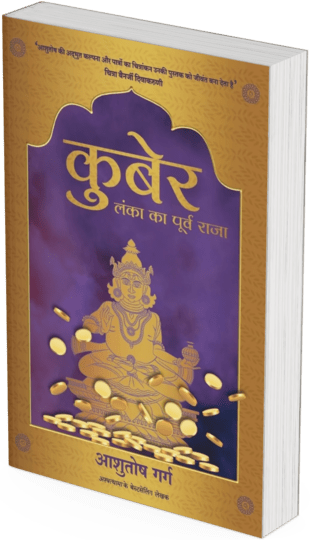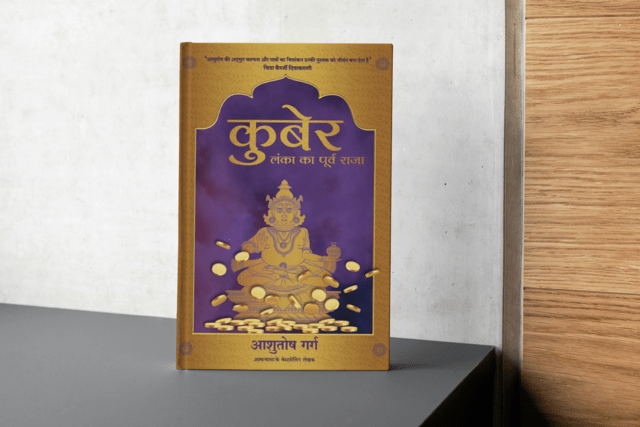Bharatiya (that is Indian) culture is a magical tapestry.
It is a perfect balance of science and philosophy.
While most of the people believe that Dharma is religion and it is mostly about afterlife. It is not a correct definition. Dharma is much more than – religion. And the Bharatiya culture considers Dharm (Dharma), Arth (Artha), Kam (Kama) and Moksh(Moksha) as four important aspects of the life.
Even to perform Dharma or Kama, you need Artha.
The wealth is never considered evil by ancient Indian culture. As Lord Vishnu is considered as the global superpower looking for well-being of all the species and keeps reincarnating himself as different avatars, as per the need of time, his wife or consort Lakshmi devi is the Goddess of wealth. A householder cannot survive without wealth and cannot walk on the path of Dharma with empty stomach.
While every householder prays Lakshmi ma so she can bless him/her with positive wealth and keep the evil-wealth (A-Lakshmi) away (so the wealth follow the right path), he/she knowingly/unknowingly also prays to Kuber – the treasurer of wealth. There is a temple of “Kuber Bhandari” in Gujarat. And, I am sure there may be more.
At the same time, it is also a real fact that not much is known about Kuber. A lot of people know that he was a half brother to Ravan or Ravana – the legendary character from ancient Indian tales. Enthusiasts of the Sanskrit literature also remember the reference of Kuber from the famous magnum opus “Meghdootam”. Beyond that, his life is almost unknown.
| Book Title | : | Kuber कुबेर: लंका का पूर्व राजा |
| Author | : | Ashutosh Garg |
| Published by | : | Manjul Publishing House ( 25 June 2022) |
| # of Pages | : | 236 (Paperback) 212; 1232 KB (Kindle EBook) |
| # of Chapters | : | 28 |
| Purchase Link(s) | : |
So when we came to know about “Kuber” – a Hindi book about this legendary character, we were curious to explore it. We got a chance to read it and we found it interesting.
This Is Here In For You
Book Cover:
Being a gateway to the virtual world explored within, the book cover is responsible for making the first impression of the book. And thus, it can influence a large number of book purchase and/or read decisions.
Let us take a look at the cover page of this book.

Kuber | A Hindi Book By Ashutosh Garg | Book Cover
As you can see, the cover page of “Kuber” is really attractive. The background is in golden color representing the wealth. The same color is used for book title and tagline.
A line drawing of Kuber, in his iconic pose is placed in the center occupies most of the space on the book cover. Surrounded by wealth, especially falling gold coins, the cover page reflects the theme of the book quite well.
I like the cover page.
Storyline:
Let us take a bird’s eye view of the story.
It all starts with the introduction to the daily rituals of Kuber. Being the devotee to Lord Shiva he used to pray him daily on time. To show him the utmost respect he used to get fresh lotus flowers in his daily rituals. It is not an easy to get them on time, in the best condition daily, while doing his administrative works as well.
So he has appointed Bakul for the task.
Bakul is a very punctual and sincere fellow who does his work with utmost care, dedication and affection towards his lord (Kuber).
One day, however, he made a mistake that resulted into anger of Kuber.
Otherwise always found calm and composed, Kuber lost his temper and expelled Bakul not only from his duties, but from his kingdom!
This tale associated with Kuber and Bakul eventually leads to “Meghdootam”.
But, Kuber is more than just a king. He is utmost devotee of the supreme lord. When doing Tapasya (penance) his aim was not to be a wealthy, powerful or even immortal fellow. He wanted to remain the follower of the lord and seek the supreme power’s blessings on him.

Kuber | A Hindi Book By Ashutosh Garg | Book Cover
He was the son of Sage Pulatsya. The same sage who fell in a trap of Kaikasi and got married to her and became father of Ravan or Ravana, Kumbhakarna and Shurpanakha.
How the things took turns and how Kuber lost not only his kingdom but also his priced possession, his Pushpak viman to Ravan/Ravana, how he became the wealth manager of Devas and other stuff is explored in the book quite interestingly. And over the course of the story you will meet with कुबेर, बकुल (यक्ष), मंदाकिनी, भद्रा, विश्वकर्मा, महर्षि पुलस्त्य, राजर्षि तृणबिंदु, तृणबिंदु की पुत्री हविर्भू, सुकेश, सुमाली, केतुमती, कैकसी, विद्युत्केश, , and others.
Views and Reviews:
The author Ashutosh Garg has a really good command over the language. Being associated with the task of translating many author’s books in Hindi, his expertise got even sharper. He is really convincing as a writer.
He reveals his intentions behind exploring this story from ancient Indian tales due to many reasons and he has mentioned them in the “fore-word” section.
He says:
पौराणिक साहित्य में ऐसे अनेक पात्र हैं जिनका नाम तो बहुत है किंतु उनके विषय में जानकारी का अभाव है।
– – – – – – – – – – – –
कुबेर, धन का देवता है, किंतु विडंबना यह है कि आज का मनुष्य, धन को इतना महत्व देता है, फिर भी वह धन के देवता के जीवन से पूरी तरह अनभिज्ञ है।
– – – – – – – – – – – –
कुबेर पौराणिक साहित्य का एक महत्त्वपूर्ण किंतु उपेक्षित पात्र है। उसकी कथा के माध्यम से इस उपन्यास में कुछ ऐसी बातें कहने का भी प्रयास किया गया है जो वर्तमान से जुड़ी और अत्यंत प्रासंगिक हैं। हज़ारों वर्ष पुरानी पौराणिक कथाओं की सत्यता हमेशा से विवाद के घेरे में रही है। लोग इन पर सहजता से विश्वास नहीं करते।
One of the challenges for any author is to represent his characters (well, he is the creator of the book, the virtual universe, so, we can call the characters of the book, his characters, right?) in the way he visualized them in his/her imagination. Even tougher is to keep the balance between descriptions and actions. Ashutosh Garg has mastered the art through experience. And, it is quite evident in the book at various places. For example:
कुबेर का क़द छोटा था परंतु उसकी महत्त्वाकांक्षाएँ आकाश से भी ऊँची थीं। वह स्वभाव से थोड़ा प्रमादी किंतु अपने सिद्धांतों का पक्का था।
– – – – – – – – – – – –
भद्रा, भगवान सूर्यदेव और छाया की पुत्री थी। वह सचमुच स्वभाव से विनम्र और सौम्य थी।
– – – – – – – – – – – –
‘यह मत भूलो भद्रा कि मंदाकिनी के सौंदर्य-पाश में फँसने के कारण ही बकुल ने अपने कर्तव्य की उपेक्षा की है। इसलिए इस अपराध का दंड भी बकुल और मंदाकिनी को संयुक्त रूप से भोगना पड़ेगा। तुम्हारी दृष्टि में मंदाकिनी निर्दोष हो सकती है किंतु मैं राजा हूँ और यह ज़रूरी है कि मेरा निर्णय, न्याय की कसौटी पर खरा उतरे!’
When someone humiliates you, the scar that took place on your heart will remain there for very long, if not forever. It works in two ways. If you are a reasonable person, you will develop empathy towards others. If not, you will develop habit of reinforcing similar experiences on others; you will enjoy being cruel to the others. And, in most of the cases “those subjects” would be the one who can’t or don’t want to fight back with you, due to various reasons.
‘बकुल की घटना से मुझे अपने जीवन का वह दुर्भाग्यपूर्ण अध्याय याद आ गया, जब मुझे भी अपने घर से अपमानित करके निकाला गया था। मैं जानता हूँ अपमान का दंश कितना पीड़ादायक होता है… मुझे भली-भाँति आभास है कि ऐसा होने पर मन पर कैसा पहाड़ टूटता है!’
– – – – – – – – – – – –
‘मैं जानती हूँ कि पीड़ा से भरा अतीत, व्यक्ति के वर्तमान को भी बोझिल कर देता है,’ भद्रा ने बात सँभाली। ‘परंतु मन की बात कह देने से हृदय पर पड़ा बोझ हलका हो जाता है।
This is a very complicated human behavior and the author is able to represent it in the book, quite effectively.
Like most of the books rooted in ancient Indian literature, this one also comes with some wisdom lessons. I urge you to remember and use them to anchor you during challenging times.
जन्म की तरह मृत्यु की डोर भी विधि के हाथ में होती है और नियत समय से पहले, कोई प्राणी मर्त्यलोक को छोड़कर नहीं जा सकता।
– – – – – – – – – – – –
‘संतान को शक्ति और ज्ञान से संपन्न करना माता-पिता का कर्तव्य होता है, किंतु उसे योग्य बनाकर जन-कल्याण के लिए स्वतंत्र छोड़ना भी माता-पिता का ही धर्म है।’
– – – – – – – – – – – –
परिस्थितियाँ प्रतिकूल हों तो व्यक्ति को विवेक और संयम से काम लेना चाहिए।
– – – – – – – – – – – –
अधीर होने से काम बनता नहीं बल्कि बिगड़ जाता है।’
– – – – – – – – – – – –
जीवन की सबसे बड़ी विडंबना यही है कि वह उन लोगों के बिना भी चलता है जिनके बिना हम इसके चलने की कल्पना नहीं कर पाते!
– – – – – – – – – – – –
जीवन की यही विडंबना है कि उसे काटने के लिए उसे जीना पड़ता है।
– – – – – – – – – – – –
मृत्यु अवश्यंभावी है, फिर भी मृत्यु का भय हमें अनेक संकटों से बचाकर रखता है। यदि व्यक्ति के मन से मृत्यु का भय समाप्त हो जाए तो उसमें संसार का रक्षक अथवा भक्षक बनने की भावना प्रकट हो सकती है।
– – – – – – – – – – – –
राजा के सिर पर राजमुकुट के अलावा अहंकार का बोझ भी होता है। वह बोझ, राजा को झुकने और अपनी भूल सुधारने का अवसर नहीं देता।
– – – – – – – – – – – –
कहते हैं, अल्पायु में ज्ञान का जल अधिक पड़ जाए तो मनुष्य के भीतर प्रायः अहंकार का बीज जड़ पकड़ लेता है।
– – – – – – – – – – – –
फिर भी उनकी दृष्टि में संतान, माता-पिता के मध्य सेतु की तरह होती है। वह विपरीत सिरों पर खड़े माता-पिता को एक-दूसरे के धुर विरोधी होने के बावजूद परस्पर जोड़कर रखती है।
– – – – – – – – – – – –
भय, हृदय में स्थान बना लेता है तो फिर भय का कारण समाप्त हो जाने पर भी उसका प्रभाव मन पर बना रहता है।
– – – – – – – – – – – –
भूल के लिए क्षमा माँग लेने से मन तो हल्का हो सकता है किंतु उससे दूसरे को हुई हानि की क्षतिपूर्ति कभी नहीं हो सकती।
– – – – – – – – – – – –
अहंकार, बुद्धि पर पड़ा ऐसा छद्मावरण है, जो पारदर्शी लगता है किंतु वास्तव में, व्यक्ति के विवेक को दृष्टिहीन और भ्रमित कर देता है।

Kuber | A Hindi Book By Ashutosh Garg | Book Cover
Usually, being parents makes you mature, humble, responsible and wise. But, that is not the case for some. For some, who are more self-centered and interested only in carnal pleasures and material happiness, the stuff works differently. The author has elaborated this behavior quite effectively in this book.
कहते हैं, माता अपने पुत्र के लिए संसार के किसी भी सुख का त्याग कर सकती है किंतु सालकटंकटा ने अपने सुख के लिए पुत्र का त्याग कर दिया था। आख़िर, विद्युत्केश और उसकी काम-पिपासु पत्नी ने उस नवजात शिशु को एक पर्वत-शिखर पर मरने के लिए अकेला छोड़ दिया। उनका विचार था कि भोजन-पानी के अभाव में बालक की स्वतः मृत्यु हो जाएगी।
– – – – – – – – – – – –
शील, स्त्री और पुरुष दोनों का आभूषण है। उसका महत्त्व तन पर पड़े वस्त्र से कई गुना अधिक होता है।
Same way, it is said that women are softer at heart and emotional by nature. The things can be different in this case also. So, consider that every rule has exceptions.
स्त्रियों में छल को भाँपने का जन्मजात गुण होता है। उन्हें बहुत दूर से व्यभिचार की गंध आ जाती है।
– – – – – – – – – – – –
मातृत्व का भाव स्त्री के हृदय को असाधारण रूप से सौम्य बना देता है।
The Bharatiya culture believes in the cyclic behavior of time. I found some interesting lines in the same regards.
काल की गति अवश्य सूक्ष्म है, किंतु समय का पहिया जब घूमता है तो अपने पीछे अमिट निशान छोड़ता चलता है जो अतीत की धूल से कुछ समय के लिए ढँक जाते हैं। परंतु एक दिन चक्र की परिक्रमा पूरी हो जाती है। तब उन पुराने निशानों पर पड़ी धूल छँटती है और वे निशान, वर्तमान बनकर फिर उभरते हैं। ठीक ऐसा ही महर्षि पुलस्त्य के साथ हुआ।
– – – – – – – – – – – –
‘वर्तमान की इमारत, अतीत की नींव पर ही खड़ी होती है,’ कुबेर ने भद्रा का हाथ कंधे से हटाते हुए कहा। ‘आप सत्य कहते हैं, लेकिन वर्तमान की नींव पर ही तो भविष्य की इमारत का निर्माण होता है। बीता हुआ ”कल“ जैसा भी था, परंतु हमारा ”आज“ हमारे हाथ में है। हम उसे तो बदल ही सकते हैं। यदि ”आज“ अच्छा हो गया, तो आने वाले ”कल“ को सुनहरा होने से कौन रोक सकता है!’
While we say, “What is there in the name?” We, ourselves, are conscious enough to know that the name indeed has a significant effect. That’s why we spend hours or even days when deciding name of a newborn baby, brand, company or anything else. The author brings in some historical references for some of the names referred to in the book. Here are some lines where the characters are introduced to the reader interestingly.
महर्षि पुलस्त्य ने अपने पिता और सृष्टि के रचयिता भगवान ब्रह्मा …
– – – – – – – – – – – –
मैं वेदों का स्वाध्याय करता था, तब तुमने बहुत मन लगाकर उस ज्ञान का श्रवण किया है, इसलिए तुम्हारा भावी पुत्र विश्रवा कहलाएगा।’
– – – – – – – – – – – –
राक्षसराज हेति एवं उसकी पत्नी भया के संयोग से एक बालक का जन्म हुआ। उसका नाम विद्युत्केश…
– – – – – – – – – – – –
वह बड़ा हुआ तो उसका विवाह संध्या की पुत्री, सालकटंकटा से हो…
– – – – – – – – – – – –
‘जो जंतु जल की रक्षा करना चाहते हैं, उनकी जाति ‘रक्ष’ नाम से प्रसिद्ध होगी तथा जो जंतु, जल का यक्षण (पूजन) करना चाहते हैं, वे ‘यक्ष’ के नाम से विख्यात होंगे।’ इस तरह समस्त जल-जंतु, रक्ष एवं यक्ष जातियों में विभक्त हो गए।
– – – – – – – – – – – –
राक्षस जाति में हेति और प्रहेति नाम के दो भाई थे। फिर हेति के मन में विवाह की इच्छा जाग्रत हुई तो उसने काल की बहन, भया से विवाह कर लिया। भया का रूप अत्यंत डरावना था।
– – – – – – – – – – – –
बालक सुकेश, महादेव और पार्वती के संरक्षण में बड़ा होने लगा।..
– – – – – – – – – – – –
सुकेश का विलक्षण स्वभाव देखकर ग्रामिणी नामक एक गंधर्व-स्त्री ने अपनी पुत्री देववती का विवाह सुकेश से कर …
– – – – – – – – – – – –
दोनों ने लंबे समय तक सुखी दाम्पत्य जीवन भोगा और कुछ समय बाद देववती ने तीन पराक्रमी पुत्रों को जन्म दिया। ये थे – माल्यवान, सुमाली और माली।…
– – – – – – – – – – – –
राक्षस जाति का प्रभुत्व चरम पर था। लगभग उसी समय, नर्मदा नाम की एक गंधर्वी ने तीन कन्याओं को जन्म दिया। सुंदरी, केतुमती और वसुधा।
– – – – – – – – – – – –
माल्यवान और सुंदरी के सात पुत्र हुए : वज्रमुष्टि, विरूपाक्ष, दुर्मुख, सुप्तघ्न, यज्ञकोप, मत्त और उन्मत्त। सुंदरी ने अनला नाम की एक कन्या को भी जन्म दिया। सुमाली और केतुमती ने ग्यारह पुत्र और चार पुत्रियों को जन्म दिया। पुत्रों के नाम थे : प्रहस्त, कम्पन, विकट, कालिकामुख, धूम्राक्ष, दंड, महाबली, सुपार्श्व, संहरादि, प्रघस और भासकर्ण। उनकी चार कन्याएँ थीं : कुंभीनसी, कैकसी, पुष्पोत्कटा और राका। सबसे छोटे भाई माली की पत्नी वसुधा के भी चार पुत्र हुए : अनल, अनिल, हर और सम्पाति।
– – – – – – – – – – – –
विश्रवा के बढ़ते प्रताप और ज्ञान से प्रभावित होकर उस समय के तत्ववेत्ता महर्षि भरद्वाज ने अपनी पुत्री इलाविदा का विवाह पुलस्त्य-नंदन विश्रवा से कर दिया।
– – – – – – – – – – – –
‘इसकी कुत्सित देह (बेर) को देखकर ही मैंने इसका यह नाम रखा है!’ विश्रवा ने अनमने ढंग से कहा और चले गए।
See, how detailed the account of events and characters is maintained by the author.
The author is good at elaborating surroundings and natural habitats. For example:
दक्षिण समुद्र के तट से लगभग सौ योजन की दूरी पर त्रिकूट नामक एक पर्वत के निकट सुबेल नाम का एक और ऊँचा पर्वत है। इस पर्वत का बीच वाला शिखर किसी विशाल मेघ की भाँति दिखाई पड़ता
Also, the wisdom lines are not uttered through the mouth of prime characters, sages, seers and Gods only. The author has given interesting lines to almost all the characters who appears for a reasonable time in the book. For example:
प्रभुत्वशील व्यक्ति के कुटुंबियों का स्वयं को सामर्थ्यवान समझने लगना नई बात नहीं है।
‘संकोच मत करो, बकुल। शंका, असंतोष की जननी है। इसका समाधान तुरंत कर लेना चाहिए।
बकुल जानता था कि भूल से अधिक, भूल को छिपाने के लिए बोला गया झूठ कष्टकारी होता है!
‘प्रभु, दुख लँगड़ा होता है। उसे एक हृदय से दूसरे तक पहुँचने के लिए सहारा चाहिए। पीड़ित मन की वेदना सुनने वाला कोई मिल जाए तो दुख अपनी विकलता भूल जाता है। फिर वह कुलाँचें भरता हुआ दो हृदयों के बीच की दुष्कर यात्र को सहज पूरा कर लेता है।’
However, if I am allowed quote only a single phrase, I would probaby be settled for the following.
असफलता, अधैर्य की जननी है।
I found it quite intriguing, well-thought and well-analysed attribute of human behavior.
Well, there are many aspects we can talk about for the book, but then, it will add strong spoilers, ruining your reading experience. But, by now, you must have got an idea about the content and quality of the book alongwith the glimpses of storyline.
The book could have some interesting trivia regarding the temples of Kuber, what happened to him after the war of Ramayana and more.
Definitely, a good book to introduce your children and other enthusiasts to one of the most prominent God or demi-God – Kuber.
Summary:
Overall an interesting book that tries to collect the maximum information from well-known ancient Indian literature and present them in the form of an interesting book. The life-lessons and words of wisdom contained within is the most prominent reason you want to go for it.
ThinkerViews Rating:
Around 7.5 stars out of 10.
Quick Purchase Links:
- Buy - Kuber by Ashutosh Garg - Paperback - Amazon IN
- Buy - Kuber by Ashutosh Garg - Kindle EBook - Amazon IN
- Buy - Kuber by Ashutosh Garg - Paperback - Amazon US
- Buy - Kuber by Ashutosh Garg - Kindle EBook - Amazon US
Over To You:
If you already have read the book do share your remarks and thoughts via comments below. Does this review help you in making your decision to buy or read the book? Do not forget to share this article with your friends over various social networks. Please follow/subscribe us on various Social networks like Twitter, Facebook, YouTube, Spotify, Amazon Prime Music, Audible, and others. And yes, you may like to subscribe to our RSS feeds to get latest updates for the site to land right in your mail box.
 ThinkerViews – Views And Reviews Personal views and reviews for books, magazines, tv serials, movies, websites, technical stuff and more.
ThinkerViews – Views And Reviews Personal views and reviews for books, magazines, tv serials, movies, websites, technical stuff and more.



